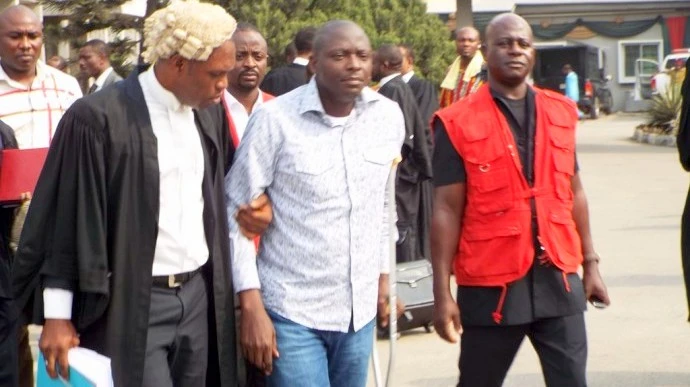From corruption to job racketeering, from transparency issues to procurement violations, there has never been any time the Nigerian Maritime Administration and Safety Agency (NIMASA) has not been in the news since its inception.
While we acknowledge the success recorded by the agency, especially the automation of the registration process of Shipping Companies and Agents, the agency battles with transparency problems in the conduct of its financial deals.
This article explores the criticisms against the Nigerian Maritime Administration and Safety Agency, one of Nigeria’s stakeholders in the maritime sector.
Job racketeering
The core the agency has been dealing with even since its days as National Maritime Authority (NMA), is the issue of job racketeering.
Job or employment racketeering is the illegal and fraudulent act of selling government vacancies to desperate job-seekers. Buying and selling of job offers is synonymous to most of what some analysts call “juicy” positions and ministries.
Recently, a former desk officer at the Federal Character Commission, Haruna Kolo, narrated before the House of Representatives committee how he worked with her boss and the Chairperson of the FCC, Muheeba Dankaka, to sell vacancy slots to desperate job hunters
This is exactly the practice at NIMASA. Jobs are sold to the highest bidders and most politically influenced individuals.
For instance, in the 1990s, recruitment into the agency was shrouded in secrecy, and at the end, it was alleged that most of the employees were given jobs based on their political connection instead of experience.
A recent publication by Nigeria’s online platform Sahara Reporters, revealed how the incumbent NIMASA DG Dr. Bashir Jamoh secretly employed 500 people who are connected to powerful politicians and political elites.
SR alleged that the jobs were given out to the powerful class without an official advertorial or interviews. It is described as “slots”. The DG denied the allegations.
Corruption
During the military regime, it was also alleged that the National Maritime Authority administered the Ship Acquisition and Ship Building Fund and disbursed the highest percentage of the loans to close allies of the military government at the time.
The loans were intended to boost ownership of ships by Nigerians. The same corruption allegations that plundered the agency to comatose during the military regime continue unabated even during civilian rule.
For instance, a former Director at the agency Captain Warredi Enisuoh was arrested early in 2023, for alleged embezzlement by the officials of Nigeria’s anti-graft agency (EFCC).
He had been facing alleged financial crimes since 2015 along with a former Director-General of the agency, Patrick Akpobolokemi.
In April 2023, another case of N1.1 Billion came up in Lagos against a former Executive Director of NIMASA Ezekiel Agaba.
Another one in April 2023, borders on the former DG of the agency Akpobolokemi, as Justice Tijjani Ringim of the Federal High Court sitting in Lagos granted an order of interim forfeiture of the sum of N725,345,897.77 and property located at Plot J 37A 218 Close, 2nd Avenue, Banana Island, Ikoyi, Lagos, which were connected with the former DG, reported The Punch.
Corruption is the biggest problem facing the NIMASA. Out of the 12 DGs that had managed the affairs of the agency, only a few of them, including Barrister Mfon Usoro has a clean slate.
Accountability Allegation
Nigerian Maritime Administration and Safety Agency is one of the agencies of government that battles with accountability problems.
As one of the biggest players in the export terminal of Nigeria’s oil sector, some analysts say “it will be magical” for it to come out clean that some of its officials didn’t have knowledge of massive oil theft in Nigeria’s waterways.
Due to oil theft, Nigeria has reportedly lost N16.25 trillion since 2011 to date, according to a report by the Nigerian Extractive Industry Transparency Initiative (NEITI).
NEITI is one of Nigeria’s anti-corruption institutions. The agency’s boss, Ogbonnaya Orji, described the situation as “unabated crude oil theft” when he submitted his report to the House Committee on Public Accounts.
In September 2023, the NIMASA boss was among the agencies’s heads that were invited for questioning by the House of Representatives ad hoc committee investigating crude oil theft.
Nothing has been heard about the investigation at the time of publication. NIMASA is among the agencies working in export terminals of all the nation’s oil sector.
Procurement violations
NIMAS board have also been accused of violating Procurement Act, 2007, in the manner they arbitrarily sign contracts worth billions of Naira.
Just before the end of August 2023, the Jamoh was also accused of inflating the budgets of the agency.
In July 2022, the Senate Panel on Public Accounts ordered the arrest of Dr Jamoh, for allegedly paying $5m to a legal firm as a professional fee for the recovery of a $9.3bn loss.
Transparency problem
The transparency issue is another point some maritime players have raised against the agency.
The list of corruption and violations of law establishing the NIMASA goes on and on. The agency needs to address these criticisms for a better perception within and outside the country.


